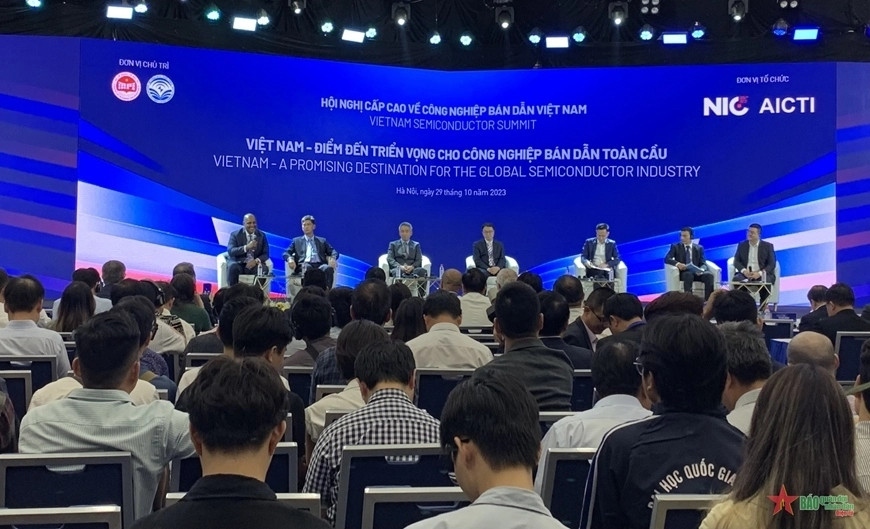
VOV.VN - The semiconductor industry is expected to open up opportunities for Vietnamese businesses to step into the most modern and fundamental playground in the digital transformation process.

In the early years of the 2000s, the semiconductor industry was in its infancy in Vietnam which was marked by the presence of several tech giants such as Intel and Samsung. Shortly afterwards, many foreign firms came to the country to open offices or work on human resources training with local universities. The first Microchip Design Research Center was also established at Ho Chi Minh City National University in 2005.
After two decades, Vietnam is set to welcome a new wave of semiconductor investment following its lifting of relations to a comprehensive strategic partnership with the United States, a global high-tech power, in 2023.
Vietnam made up the third largest Asian supplier of chips to the US after Malaysia and Taiwan (China), with export turnover hitting US$562 million between February 2022 and February 2023. However, the value was mainly generated by foreign firms, especially Intel which has poured US$1 billion into Saigon Hi-tech Park since 2006.
Furthermore, Samsung Electronics, a tech giant from the Republic of Korea that has been operating in the Vietnamese market for two decades, has invested in chip packaging facilities as part of its local operations.
About 40 other FDI firms have also poured investments into integrated circuits design and research and development (R&D) activities, including human resource training. Some of those brands include Qualcomm, Texas Instruments, SK Hynix, Hayward Quartz Technology, and Synopsys.
These can be seen as signals that the Vietnamese market is one of the primary options for FDI firms to develop the value chain of high-tech industries such as semiconductors. According to Technavio, the country’s semiconductor industry is estimated to reach US46.16 billion in value by 2024.

Experts believe that Vietnam has ample room to develop the value of high-tech industries, including semiconductors and microchips, although they warn that it cannot depend too much on FDI businesses.
“In the semiconductor value chain in Vietnam, FDI businesses focus mainly on chip packaging and design, not chip production. They specialize in either design or production outsourcing, and may leave very quickly. To develop a sustainable and long-term semiconductor industry, Vietnam has no choice but to develop its own semiconductor industry,” analyses Assoc. Prof., Dr. Nguyen Duc Minh, head of Electronics Department of Hanoi University of Science and Technology.
Reality indicates that Vietnamese firms find it challenging to become suppliers for manufacturing and packaging factories of FDI businesses. These international businesses and multinational corporations have high demands and bring their existing supply partners from abroad.
Prof. Dr. Tran Xuan Hoai of the Vietnam Academy of Science and Technology suggests that the country should learn from Malaysia’s experience.
“Malaysia has a complete semiconductor manufacturing ecosystem with domestic businesses taking care of all stages from design, manufacturing to chip assembly and testing. Meanwhile, none of Vietnamese firms are able to directly provide materials for the chip assembly and packaging processes of Intel and Samsung,” says Prof. .Dr. Hoai.
“Obviously, if they want to create a symbiotic relationship with leading semiconductor businesses, Vietnamese firms should forget low-productivity jobs such as providing raw materials, and focus on brainpower jobs requiring a high level of technology. It can fall into very narrow segments,” adds the professional.
In his view, such supporting firms are common in the US with a workforce of 10 to 15 people. A few groups in the nation are able to do it, and if done well then they can make use of countless orders from FDI or acquired firms.
Nguyen Thien Nghia, an official of the Ministry of Information and Communications who has engaged in formulating the draft semiconductor industry development strategy, suggests that the country should make specialised chips, instead of entering the global race of producing the most advanced and high-end chips.
According to the national semiconductor industry strategy, Vietnam is expected to both attract FDI enterprises and improve domestic capacity at the same time.
“We don’t necessarily have to produce a product right away, but we can join large companies’ ecosystem and at the same time focus on the low- and mid-range segments, where we have good competitive advantages in terms of price,” he suggests.
After two decades, the country once again has the opportunity to gear up in the race. During working visits held in 2023, senior leaders of the US and Japan expressed their desires to support the Vietnamese side with semiconductor chip production. It’s not by chance that John Neffeur, president and CEO of the American Semiconductor Industry Association, and Jensen Huang, president and CEO of Nvidia - the world’s largest chip producer, travelled to Hanoi one after another in the first half of December 2023, to explore cooperation opportunities in the Vietnamese market.
VOV.VN - Many significant financiers from developed countries are ready to invest in the country's semiconductor chip manufacturing, according to the Ministry of Science and Technology.
Vietnam hopes Samsung will become a strategic investor in the context that the country is building a strategy to develop the semiconductor industry and promote innovation, Deputy Minister of Planning and Investment Nguyen Thi Bich Ngoc has told General Director of Samsung Vietnam Choi Joo Ho.
VOV.VN - Prime Minister Pham Minh Chinh and senior Vietnamese officials attended a panel discussion with global businesses in Davos, Switzerland, on January 16, examining ways to develop artificial intelligence (AI), automobile technology, semiconductor chips and ecosystems in Vietnam.
VOV.VN - Many Vietnamese universities have unveiled plans to enroll and train students in the integrated circuit (IC) and semiconductor design industry in the year ahead, reported Tuoi Tre newspaper.
Bình luận
Bình luận của bạn sẽ được xét duyệt trước khi đăng